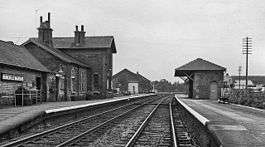Burgh-le-Marsh railway station
| Burgh-le-Marsh | |
|---|---|
|
Station in 1967. | |
| Location | |
| Place | Burgh Le Marsh |
| Area | East Lindsey |
| Operations | |
| Original company | East Lincolnshire Railway |
| Pre-grouping | Great Northern Railway |
| Post-grouping |
London and North Eastern Railway Eastern Region of British Railways |
| Platforms | 2 |
| History | |
| 3 September 1848 | Opened as Burgh |
| 9 July 1923 | Renamed Burgh-le-Marsh |
| 2 May 1966 | Closed to goods traffic |
| 5 October 1970 | Closed to passenger traffic |
| Disused railway stations in the United Kingdom | |
|
Closed railway stations in Britain A B C D–F G H–J K–L M–O P–R S T–V W–Z | |
|
| |
Burgh-le-Marsh was a railway station on the East Lincolnshire Railway[1] which served the village of Burgh Le Marsh in Lincolnshire between 1848 and 1970. It originally opened as Burgh, but was renamed in 1923. Withdrawal of goods facilities took place in 1966, followed by passenger services in 1970. The line through the station is now closed.
History
The station was opened on 3 September 1848 as Burgh[2] after the settlement of Burgh Le Marsh, and renamed following the railway grouping in 1923 to Burgh-le-Marsh to distinguish it from Burgh-by-Sands on the Carlisle and Silloth Bay Railway.[2] It was constructed by Peto and Betts civil engineering contractors who, in January 1848, had taken over the contract to construct the section of the East Lincolnshire Railway between Louth and Boston from John Waring and Sons.[3] This section was the last to be completed in September 1848 at an agreed cost of £123,000 (£NaN in 2016[4]).[3] The station was provided with parallel platforms, with the main buildings, goods shed, cattle dock and signal box on the up (east) side.[5] Immediately to the north of the station was a level crossing over the main road leading to Burgh, two miles to the south-east.[5] A long refuge siding at the station was capable of holding 80 wagons.[5] The July 1922 timetable saw six up and five down weekday services, plus one Sunday service each way, call at Burgh.[6] The station was closed to goods traffic on 2 May 1966[7] and to passengers on 5 October 1970.[8]
| Preceding station | Disused railways | Following station | ||
|---|---|---|---|---|
| Willoughby Line and station closed |
Great Northern Railway East Lincolnshire Line |
Firsby Line and station closed | ||
Present day
The station buildings and signal box have survived virtually intact in private ownership and are intermittently in use as tea-rooms.[9] The goods shed is also still standing and once housed a railway museum, now closed and whose contents have been dispersed.[10] A section of the trackbed to the south between Burgh and Bratoft is owned by the National Trust and is open as a footpath.[9] The trackbed to the north has been severed just beyond the station by the bypass around the village.[9]
References
- ↑ Conolly 2004, p. 17, section B4.
- 1 2 Butt 1995, p. 48.
- 1 2 Ludlam 1991, p. 14.
- ↑ UK CPI inflation numbers based on data available from Gregory Clark (2016), "The Annual RPI and Average Earnings for Britain, 1209 to Present (New Series)" MeasuringWorth.
- 1 2 3 Ludlam 1991, p. 49.
- ↑ Ludlam 1991, pp. 111-112.
- ↑ Clinker 1978, p. 22.
- ↑ Butt 1995, p. 88.
- 1 2 3 Stennett 2007, p. 39.
- ↑ Hill & Vessey 1999, p. 104.
Sources
- Butt, R. V. J. (1995). The Directory of Railway Stations: details every public and private passenger station, halt, platform and stopping place, past and present (1st ed.). Sparkford: Patrick Stephens Ltd. ISBN 1-8526-0508-1. OCLC 60251199.
- Clinker, C.R. (October 1978). Clinker's Register of Closed Passenger Stations and Goods Depots in England, Scotland and Wales 1830-1977. Bristol: Avon-Anglia Publications & Services. ISBN 0-905466-19-5.
- Hill, Roger; Vessey, Carey (1999) [1996]. British Railways Past and Present: Lincolnshire (No. 27). Kettering, Northants: Past & Present Publishing Ltd. ISBN 978-1-85895-083-9.
- Ludlam, A.J. (1991). The East Lincolnshire Railway (Locomotive Papers No. 82). Headington, Oxford: The Oakwood Press. ISBN 0-85361-416-4.
- Philip Conolly, W. (2004) [1958]. British Railways Pre-Grouping Atlas and Gazetteer. Hersham, Surrey: Ian Allan Ltd. ISBN 978-0-7110-0320-0.
- Stennett, Alan (2007). Lost Railways of Lincolnshire. Newbury, Berkshire: Countryside Books. ISBN 978-1-84674-040-4.
Coordinates: 53°10′33″N 0°12′30″E / 53.17594°N 0.20842°E
